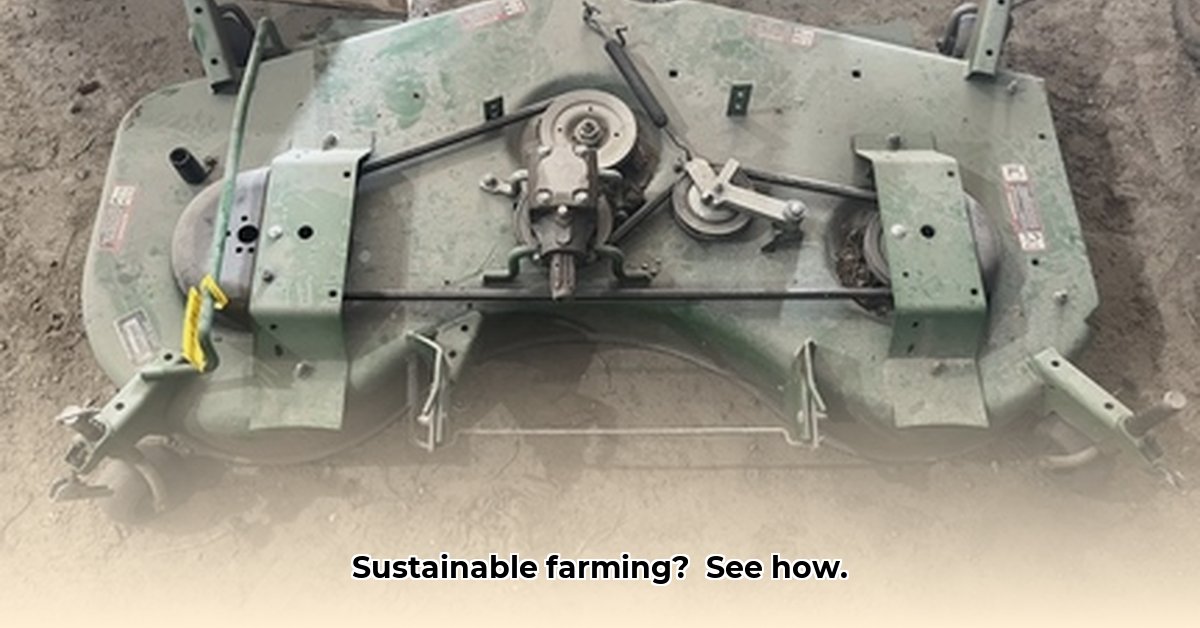
Sinclair Tractor Kalona, a prominent agricultural equipment dealer, is uniquely positioned to champion sustainable farming practices in the region. Part of a larger network encompassing thirteen John Deere locations and five NAPA Auto Parts stores, Sinclair Tractor possesses a significant regional footprint and diverse customer base, offering a powerful platform for promoting eco-friendly farming methods. However, the extent of their current sustainability initiatives remains unclear, presenting both opportunities and significant challenges. This article analyzes Sinclair Tractor's potential to lead sustainable agriculture adoption, outlining actionable steps for the company, farmers, and government agencies. Learn more about other Sinclair Tractor locations, like the one in Houghton, IA, by visiting this site.
A Powerful Position, Yet Uncharted Territory
Sinclair Tractor Kalona's diverse customer base—ranging from farmers to landscapers and contractors—presents a substantial opportunity to introduce and promote sustainable agricultural solutions. The potential impact of integrating eco-friendly practices into their daily operations is considerable. However, readily available information on their current sustainability efforts is limited, hindering a complete assessment of their commitment and progress. This lack of transparency represents a significant challenge.
Operational challenges also exist. Providing timely service for the sophisticated equipment required for sustainable agriculture is crucial, demanding specialized knowledge and flexibility. Do they possess the necessary workforce expertise and sufficient capacity to handle the demands of advanced, and often complex, environmentally friendly farming technologies?
Planting the Seeds of Change: Actionable Steps
To maximize the potential for sustainable agriculture adoption, a collaborative effort is required from Sinclair Tractor, farmers, and government agencies.
Actionable Steps for Sinclair Tractor
Short-Term Goals (Within the Next Year):
- Establish a dedicated sustainability team: This team should focus on integrating sustainable practices across all business operations.
- Invest in employee training: Equip the workforce with the knowledge and skills necessary to support sustainable farming technologies.
- Form strategic partnerships: Collaborate with companies specializing in sustainable agricultural solutions to access new ideas and resources.
- Develop comprehensive online resources: Create a user-friendly website providing information on sustainable farming practices to empower customers.
Long-Term Vision (Next 3-5 Years):
- Develop a comprehensive sustainability strategy: This roadmap will guide efforts and ensure consistent progress.
- Invest in alternative fuel infrastructure: Reduce reliance on fossil fuels and lower the environmental footprint.
- Offer financial planning assistance to farmers: Help farmers navigate the financial aspects of transitioning to sustainable agriculture.
- Expand partnerships: Diversify partnerships to include suppliers of sustainable inputs, like seeds and fertilizers, for a holistic approach.
Actionable Steps for Farmers
Short-Term Goals (Within the Next Year):
- Actively seek information: Explore resources related to sustainable technologies and funding opportunities.
- Participate in training programs: Attend workshops and training sessions to gain practical skills.
Long-Term Vision (Next 3-5 Years):
- Embrace sustainable farming practices: Transition to sustainable methods for environmental and economic benefits.
- Maximize profitability through sustainable practices: Effectively utilize sustainable technologies and resource management to increase profits while minimizing environmental impact.
Actionable Steps for Government Agencies
Short-Term Goals (Within the Next Year):
- Partner with Sinclair Tractor Kalona: Jointly develop educational programs and provide financial incentives for farmers adopting sustainable practices.
Long-Term Vision (Next 3-5 Years):
- Provide sustained support for sustainable technologies: Invest in policies supporting sustainable agricultural technologies.
- Implement policies incentivizing sustainable practices: Drive widespread adoption of sustainable farming methods through incentives and regulations.
Weathering the Storm: Risk Assessment
Despite the significant potential, several risks need mitigation.
| Risk Factor | Likelihood | Impact | Mitigation Strategy |
|---|---|---|---|
| Low Farmer Adoption | Medium | High | Extensive educational campaigns, attractive financial incentives, and demonstration farms showcasing the benefits. |
| Employee Expertise Gap | Medium | Medium | Comprehensive and ongoing training programs; partnerships with technical experts and training institutions. |
| Technological Limitations | Low | Medium | Thorough technology vetting; prioritize reliability and ease of use. |
| Supply Chain Disruptions | Medium | Medium | Diversified sourcing, strong supplier relationships, and robust contingency planning. |
| Regulatory Landscape Changes | Low | Medium | Close monitoring of regulations; proactive adaptation strategies; engagement with policymakers. |
A Brighter Future for Farming
Sinclair Tractor Kalona has the potential to become a leader in promoting sustainable agriculture. Their extensive network and established relationships offer a powerful platform for change. However, success hinges on proactive steps, open communication, and strong collaboration among all stakeholders. The future of farming, and our planet, depends on it. The potential for growth and positive impact is immense, but careful planning and action are crucial to realizing this potential.